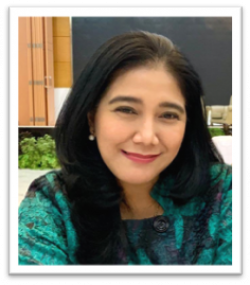Nurul Eka Hidayati
Second Chairperson for the Indonesian Association of Social Workers and Secretary General for the Indonesian Social Work Consortium, Indonesia
 Nurul Eka Hidayati currently works as the second chairperson for the Indonesian Association of Social Workers and as Secretary General for the Indonesian Social Work Consortium. With over twenty years’ experience as a social worker in emergency settings, Nurul now helps coordinate response efforts—specifically those focused on mental health and psychosocial support—by identifying, training, and coordinating teams of social service workers and allied professionals.
Nurul Eka Hidayati currently works as the second chairperson for the Indonesian Association of Social Workers and as Secretary General for the Indonesian Social Work Consortium. With over twenty years’ experience as a social worker in emergency settings, Nurul now helps coordinate response efforts—specifically those focused on mental health and psychosocial support—by identifying, training, and coordinating teams of social service workers and allied professionals.
Education/training
Nurul’s education and training Nurul graduated with a bachelor’s degree in social work but found that she lacked a strong understanding of the social work opportunities in Indonesia. After school, she went on to work in banking, but found that it didn’t bring her a sense of happiness or purpose in her professional life. She shifted back to social work, transitioning to work at a small social foundation focused on helping street children and poor families in eastern Jakarta. There, she found great satisfaction (albeit with a lower salary than she had in banking) helping people address the real problems they face daily. Nurul went on to do a master’s degree in social work and is currently working towards her doctorate degree in social work and social welfare sciences. In addition, she completed a special training course on MHPSS given by the psychology department of a private Indonesian university through a partnership with Caritas Germany, and then joined an MHPSS working group composed of a range of professionals, including social workers, psychologists, psychiatrists and mental health nurses. This passion for MHPSS in emergency settings and working closely with allied professionals would go on to influence the whole of her career trajectory.
The power of a well-equipped team
In her current role, Nurul has a major hand in preparing teams of social service workers and others to implement coordinated response efforts. At the onset of a disaster, she explains, it is critical to immediately build a strong response team that understands MHPSS and has the skills and expertise necessary to bring it to those most in need, which of course varies based on the emergency at hand. Nurul has found that not only must she identify relevant team members, but they must develop an up-to-date intervention plan based on information from authorities that takes into consideration the local resources available. The plan must be clear and outline the relevant roles for all involved, detailing who is doing what and when. Nurul uses technical guidelines to steer the MHPSS intervention and ensure high-quality, consistent and harmonized delivery across the selected team. Her work overseeing the team extends beyond just initial implementation to ensuring team members are safeguarded. She makes sure they are given supervision throughout and undergo stress debriefing prior to leaving the site of the emergency.
Advocating for her work
In order to increase recognition of the importance of MHPSS, it has been necessary to raise awareness within the government. In 2013, Nurul and her colleagues introduced MHPSS in emergency settings to the Ministry of Social Affairs, which plays an influential role in planning for and enacting legal policy around disaster management. While Nurul noted there’s still a long way to go—namely in terms of strengthening local resources, involving and empowering local actors in response to emergencies—it seems this advocacy work did have an impact on the ministry’s understanding of the importance of the social service workforce. In response to COVID-19, the Indonesian Professional Social Workers Association and the Indonesian Social Work Consortium developed new guidelines for social workers in the pandemic, and set up a hotline dedicated to MHPSS support; a few weeks later, the Minister of Social Affairs went on to adopt the program, supporting the training of hundreds of workers and resourcing the operation of the hotline, 24-hours-a-day for three months.
Inspired by those she serves
Nurul notes that there are heartbreaking challenges that remain prevalent in emergency settings. These include human rights violations, particularly those committed against refugees forced to live in camps for years on end, as well as frayed social cohesion and loss of trust in authorities in times of disaster. However, she also recognizes the enormous resilience she has witnessed in the communities she has served, and how inspiring she finds it. “The hope, the unending goodness, the will to survive—that is why I love my job, they make me appreciate life more day by day,” Nurul says.
